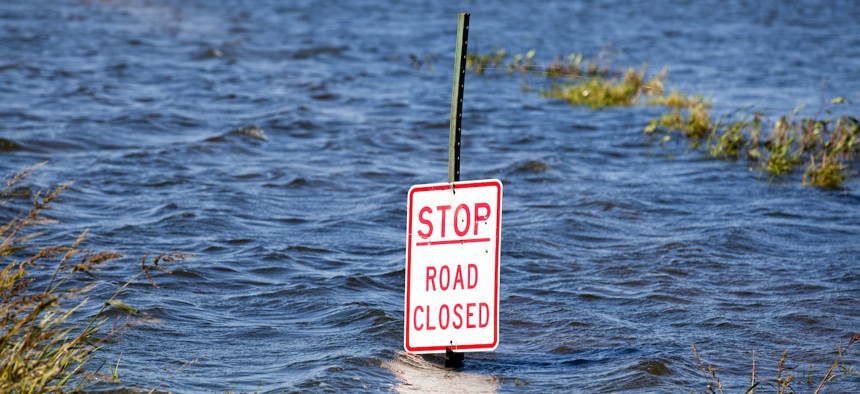
Weather and safety leave is a form of paid leave that may be used when employees cannot safely travel to their normal work site. tornadochaser/Getty Images
OPM reminds agencies of workplace flexibilities following disasters
A memo highlighting telework, paid leave and other benefits available to feds impacted by disasters corresponds with the beginning of hurricane season and a recent typhoon in the Pacific Ocean.
The Office of Personnel Management last week reminded agencies of the array of workplace flexibilities at their disposal such as leave and telework to help federal workers who have been impacted by natural disasters.
The memo, distributed by OPM Director Kiran Ahuja to heads of federal agencies, corresponds with the start of the annual hurricane season and comes shortly after Typhoon Mawar caused disruptions in Guam and the Northern Mariana Islands, both of which are under U.S. jurisdiction.
“To help assist those federal employees impacted by Typhoon Mawar and in preparation for the upcoming hurricane season, the U.S. Office of Personnel Management is reminding agencies and employees of the wide range of human resources flexibilities and procedures currently available to assist federal employees affected by severe weather and other emergency situations,” Ahuja wrote.
Ahuja noted that the dramatic expansion in both the number of federal employees and portability of agency work due to the response to the COVID-19 pandemic means agencies are better equipped to maintain continuity of operations during disasters. While that has lessened the necessity for agencies to approve weather and safety leave, a form of paid leave that may be used when employees cannot safely travel to their normal work site, there are still situations where the practice is appropriate, particularly among the roughly half of the federal workforce whose jobs still must be conducted at traditional facilities.
“There are special considerations when considering weather and safety leave for teleworking employees,” she wrote. “Specifically, an agency normally will not be able to provide weather and safety leave to a telework program participant, unless the individual is prevented from safely traveling to or working at their approved telework site during severe weather or other emergency situations.”
Telework-eligible employees may still be granted weather and safety leave if agency leaders agree that the employee could not have “reasonably anticipated” the emergency and thus were unprepared to work remotely, or in cases where the employee is prepared to work remotely but is prevented from safely doing so due to the emergency, such as if their telework site has lost power or they needed to evacuate.
Evacuations due to natural disasters can also trigger another benefit for affected employees. Ahuja wrote that agencies may offer employees continuations of pay or other travel- or per diem-related payments associated with an evacuation order.
“Use of the evacuation payments authority is discretionary,” she wrote. “The head of an employing agency or designated official must make the determination that an employee was officially ordered or authorized to evacuate.”
And in the aftermath of a disaster, OPM may establish an emergency leave transfer program, where federal employees may donate unused annual leave to employees either in their agency or elsewhere in the federal government who needs time off to recover from the disaster. In order for OPM to authorize the program, the president must first make an emergency declaration stemming from the event.
“Agencies that have employees in need of assistance should contact their headquarters to report the need,” Ahuja wrote. “OPM, in consultation with the Office of Management and Budget, will work with agency headquarters to assess the need to establish an ELTP.”
But the memo warned that federal workers impacted by a disaster who take time off in anticipation of an emergency leave transfer program should only do so by requesting advanced annual or sick leave or leave without pay, not leave that has already accrued.
“This is very important, because if an ELTP is later established, employees will not be able to retroactively substitute donated annual leave for any accrued annual leave or sick leave they used because of the adverse effects of the disaster or emergency,” Ahuja wrote.







